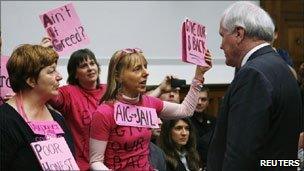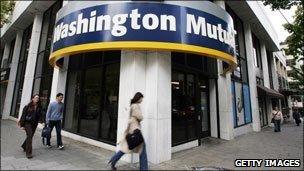Davos 2011: Will big banks be allowed to fail?
- Published

Davos experts say the collapse of another huge financial institution is unlikely
After two years of catastrophic bank and insurance failures and bailouts, are financial regulators at long last better prepared for the next big banking collapse?
Banks must not be too big to fail, governments across the G20 group of leading nations have promised.
So can taxpayers rest easy now, or are they still on the line to cough up the "ransom payment", as one official closely involved in the US bailouts put it.
The World Economic Forum in Davos - packed with regulators, central bankers, and big bank and insurance bosses - is a pretty good place to find the answer.
"What if another megabank fails?," asked a dinner session, and came up with a fairly depressing answer (under Davos rules I can report what was said, but not who said it).
Orderly resolution
Let's be clear: the failure or near-collapse of another huge financial institution like Lehman Brothers, AIG or Royal Bank of Scotland is highly unlikely declared all experts loud and clearly at the start of the session...
(... only to start swapping names and weaknesses of candidates for failure as they tucked into their sirloin steaks).
But let's assume the worst, said the session leader: "We wake up one morning, and MBB - or Mega Big Bank - is gone. What would we do?"
Here's the dilemma: do we have the right tools for an "orderly resolution" of MBB and allow it to go bankrupt or is the systemic risk so high that we just HAVE to bail it out?
The Lehman lesson
To understand the problem, the participants reminded themselves of what went wrong during the Lehman Brothers collapse.
When Lehman was allowed to collapse, the consequences for the global financial sector were dire. Credit markets froze from one day to the next, pushing several other financial institutions to the brink.

There was anger at the fact US taxpayers had to bail out struggling AIG
So why had the US authorities not done another Bear Stearns? After all, when that investment bank had gotten into trouble a few months earlier, the US Federal Reserve organised its firesale to JP Morgan Chase.
Well, for a couple of weeks the Fed tried to sell Lehman, but one potential bidder after another dropped out. When Bank of America finally walked away, US officials tried to drop Lehman into the lap of UK bank Barclays, explained one participant with intimate knowledge of the negotiations.
However, at the time Barclays itself was too fragile to take on the whole of Lehman (although once Lehman had gone into bankruptcy, Barclays could snap up its North American investment banking and trading operations on the cheap).
The problem, the experts in Davos agreed, was not a lack of legal authority to nationalise Lehman. The collapse also was not a not-so-clever attempt to send a stark warning to Congress to reform the financial sector.
Instead, the US regulators lacked five ingredients that would have allowed them to rescue such a mega bank with global operations:
Bankruptcy laws across key countries where Lehman operated were too different.
Financial regulation around the world was not harmonised.
Nobody, not even US regulators, understood the extent and complexity of Lehman's business, and fellow traders were convinced that "Lehman is not a systemic risk". "The Americans didn't know anything about the structure of Lehman's non-US operations", said one former regulator.
There was no "crossborder resolution mechanism" that would have allowed an orderly unwinding of Lehman's many complex trading positions; as a result financial markets went into paralysis.
Given all the problems above, the Fed lacked one final key ingredient: time. "When you have to do things very quickly, they can go wrong," said the ex-regulator.
And so, Lehman collapsed.
Post-Lehman traumatic shock syndrome
Politicians and regulators suffer from post-Lehman traumatic shock syndrome, said one expert on banking regulation.

Other banks failed, including Washington Mutual which went defunct in 2008
But they are still paralysed, and the ingredients for an orderly and successful "resolution" for Mega Big Bank are still missing, he said. "I came in [this session] pessimistic. Now I'm terrified."
"If we really think megabanks can't be allowed to fail, and governments have to try to bail them out, then all policy has failed," he said.
Two years after the crisis started, regulators still don't know who sits where in the chains of financial instruments, and who is leveraged (financed through debt) and how.
And a harmonisation of bankruptcy laws or regulation is not even on the horizon. "We won't have crossborder liquidation rules for at least another 10 years," said an international banker.
"National regulators don't want to deal with derivatives that have been written in New York," said an adviser to a European government. "Everybody is ringfencing and nationalising the problem."
Big is beautiful
Despite all the talk of "living wills", which banks have to draw up to show how they can go into orderly liquidation, "all megabanks are systemic" and can't be allowed to fail, the Davos experts agreed.
As a matter of fact, "it's now worse than Lehman, much worse," said one participant.
Banks actually enjoy being too big to fail, because that guarantees them a government bailout. And once they have this implicit guarantee, they find it cheaper to borrow money, because it's less risky to lend to them.
"I recently spoke to a very large hedge fund," reported one participant, and they asked me "how can we get too big to fail? We want cheaper credit [like the megabanks] ... maybe we should have even higher leverage" [i.e. borrow yet more money].
The experts call this "moral hazard", where the bail-out guarantee tempts bankers to make ever riskier bets. If it works out, they get rich. If the bank crashes, they can walk away.
And if banks get bigger and bigger as a result, if they are not only too big to fail, but also too big to save, "then you get Iceland", where the government goes bankrupt as it tries to rescue its financial sector.
Maybe we should simply head for the hills.
Just before Lehman collapsed, one banker said, one of his colleagues set out on a much-deserved holiday, an 11-day hike in the mountains. He didn't have a mobile phone with him, or any other link to the world of finance.
When he returned, his world had utterly changed.